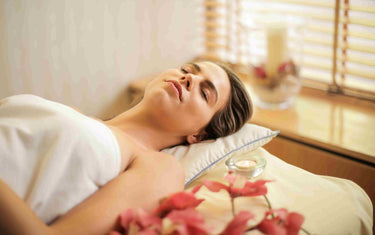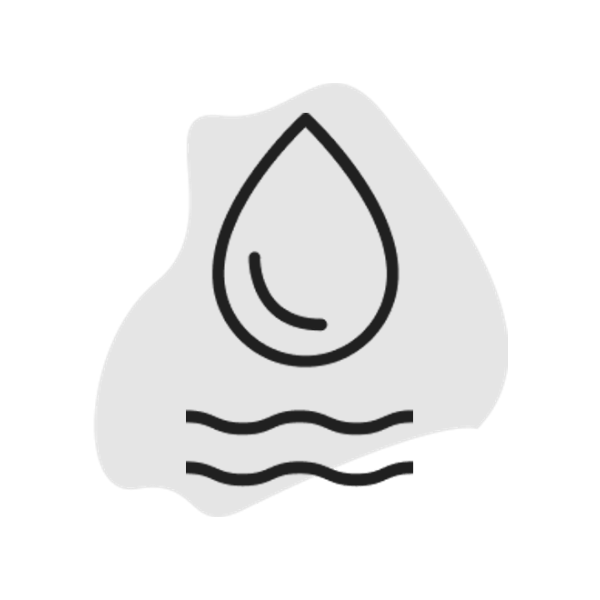7 min read / 20 February 2023 / Laura Garvin Gomez
What is an Aromatherapy Massage?
Aromatherapy massages carry numerous benefits for our minds, bodies, and souls - but what actually are they, and how do they work?

Any time we walk into a spa, we're greeted by the beautiful scents of essential oils wafting our way.
While entering a pleasantly scented environment is always welcomed, it's common to wonder why exactly spas have been designed to smell that way, and what benefits it can provide us with alongside our massage.
On top of that, some spas even offer a specific aromatherapy massage as part of their service package. But what is an aromatherapy massage? How does it differ from your traditional massages, and can you successfully recreate it at home?
We'll be exploring all the facts you need to know behind what aromatherapy massages are, how they can benefit you, and how you can tap into these calming vibes in the comfort of your own home.

What is aromatherapy?
Aromatherapy is categorised as the use of essential oils for a variety of purposes. Essential oils are natural products that are derived from a range of botanicals including herbs, fruits, resins, spices, and flowers - among other things.
They are generally extracted via two differing processes: steam distillation and cold pressing. Both of these extraction methods allow for the oil inside the botanical to be captured in its pure, concentrated form.
The overarching purpose of aromatherapy is to improve your physical, mental, and spiritual wellbeing through inhalation or topical application of these essential oils.
What is aromatherapy massage?
Aromatherapy massages combine the use of essential oils with the benefits of a traditional massage.
Essential oils are combined with vegetable-based carrier oils like jojoba, sweet almond, or grapeseed, that are commonly used for massages thanks to their lightweight and highly absorbent compositions.
As essential oils are too potent for topical application by themselves, use of these carrier oils allows their benefits to travel safely through the skin without the risk of irritation or reaction.
Both oil types, when used together, can provide relief by improving your mood, alleviating pain, and even detoxing the body depending on which oils you pick.
The action of a massage can further improve these factors, which is why many spas choose to incorporate aromatherapy into their services.
It's also very common for essential oils to be diffused throughout the spa and in the massage room as a way to encourage a relaxed, uplifting atmosphere.

What are the benefits of aromatherapy massage?
Aromatherapy massages are both calming and healing, and can affect all of your body's systems, as well as several of its senses, at the same time.
We've detailed some of the different benefits that an aromatherapy massage might provide for you below.
For relaxation and emotional regulation
The inhalation of essential oils can affect your mood in a number of different ways, with the most common influences falling on relaxation and stress relief.
This is because essential oils can strongly affect your brain's limbic system, which is responsible for regulating emotions.
Oils with high levels of linalool - a powerful compound that is known to affect serotonin levels - are said to significantly reduce feelings of anxiety, low mood, and frustration thanks to their heightened links with these systems. Lavender oil is usually the most popular choice for utilising these effects.
Other oils like bergamot or sweet orange can target energy levels and promote a more uplifting positivity. Both of these benefits can come into play during an aromatherapy massage to improve your mood as well as enhance the overall atmosphere.
For pain relief
Not all essential oils function purely from being inhaled. Topical application is another popular technique that is adopted by massage therapists to tap into the oil's physical benefits, as well as their mental ones.
Essential oils like peppermint and frankincense are widely used as relievers of pain and inflammation and can help increase circulation in the muscles to limit discomfort and encourage healing.
Antispasmodic oils like black pepper are also useful against muscular pain, as they can reduce spasms and inhibit cramping caused by straining or overuse.
These oils are usually combined with carrier oils to dilute their potency, and are applied as a part of the aromatherapy massage service.
For sleep
Those suffering with sleep issues may benefit from the calming elements of an aromatherapy massage.
Essential oils like lavender, ylang ylang, and juniper berry are all very popular for tackling sleep issues, and can be used throughout your massage to encourage a sound, undisturbed night of rest.
A 2017 study observed the importance of aromatherapy on sleep when assessing nurses working shifts. Those that received an aromatherapy massage after their shifts reported an increase in their sleep quality as well as less disturbances throughout their rest.

Which essential oils are best for aromatherapy massage?
If you're wanting to book in an aromatherapy massage for yourself, it may be best to have a look at which issues you would like to target before going into your appointment.
You can then recommend certain oils to your therapist, or ensure the services you choose make use of the ones you're after.
Alternatively, you can select your favourites from the list below and perform your own aromatherapy massage at home by blending them together with a carrier oil.
We've listed some of our top contenders for a great aromatherapy massage below.
Lavender essential oil
Lavender oil is infamous in the world of aromatherapy for its ability to combat sleep issues and promote relaxation.
Several studies have matched its high levels of linalool to its positive effects on stress, anxiety, and low mood among other issues.
Utilising lavender oil during a traditional Swedish or deep tissue massage can help combat pain or stiffness throughout the body, while simultaneously relaxing all of your immediate senses.
Learn more about the benefits of lavender essential oil.
Eucalyptus essential oil
The scent of eucalyptus oil is incredibly common in spas, largely due to its refreshing aroma that can open up the airways and encourage deeper, more relaxed breathing.
Eucalyptus is an effective decongestant, so can come in handy if you have a stubborn cold that is inhibiting you from properly winding down.
It has also been used across countless societies for its ability to treat aches and pains, making it a viable option for those with joint swelling, inflammation, or muscular discomfort.
Eucalyptus oil is most popular for use during a deep tissue massage, but can also be incorporated into other massage therapies depending on your preferences.
Learn more about the benefits of eucalyptus essential oil.
Bergamot essential oil
The bright citrus notes of bergamot oil can help boost your mood and reduce your stress levels when inhaled through a diffuser, or when used within your massage oils.
Its antibacterial and anti-inflammatory properties make it a remarkable asset to skin health, while its analgesic and anti-convulsant qualities can tackle pain and numb nerve impulses to reduce discomfort throughout your treatment.
Bergamot is also popular in scalp massages due to its slightly more niche benefit of softening and smoothing hair.
Learn more about the benefits of bergamot essential oil.
Peppermint essential oil
From relieving blocked sinuses to improving energy levels, there isn't much that the refreshing aromas of peppermint oil won't help with.
It's an especially useful remedy for migraines and headaches, so could be a worthy addition to your next scalp massage if you find yourself suffering regularly (and it's great for hair too).
Peppermint oil is also renowned for soothing inflamed joints and tired muscles, and thus is seen often in massage therapy as well as in at-home treatments.
Learn more about the benefits of peppermint essential oil.
Grapefruit essential oil
Grapefruit oil, like numerous citrus oils of its kind, is best known for keeping energy levels up and low moods down.
It is considered incredibly influential against so-called "brain fog" and can increase alertness as well a reduce fatigue, prevent stress-induced immune suppression, and clear anxious thoughts.
Grapefruit can furthermore stimulate circulation in the body and may be useful against muscular strain.
Learn more about the benefits of grapefruit essential oil.
Are there any risks involved in an aromatherapy massage?
If your aromatherapy massage is being conducted by a professional, there's little chance of risk during your procedure. If you choose to perform it on your own, however, there are some key points to ensure safety throughout the process.
Essential oils should always be diluted appropriately with a carrier oil before application to the skin. Neglecting to dilute your oils can lead to skin irritation and reactions, so it's of the utmost importance to keep on top of the amount of oil you're using.
It's also a good idea to perform a patch test on your skin to prevent unexpected allergies. If you notice any signs of an allergic reaction, cease use immediately and contact a medical professional if required.
Those that are pregnant or have any significant medical conditions should also contact a professional before performing an aromatherapy massage.

Aromatherapy massages are the ultimate form of relaxation, and can set you up with numerous benefits for your mind, body, and soul each time they're performed.
Whether conducting on yourself or heading into a spa for the full treatment, always ensure you're using oils you are comfortable with, and that you feel would positively impact you.









